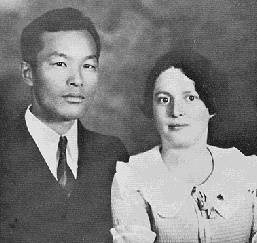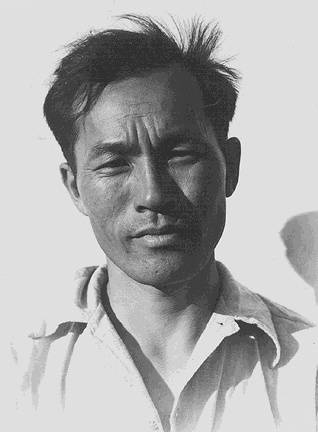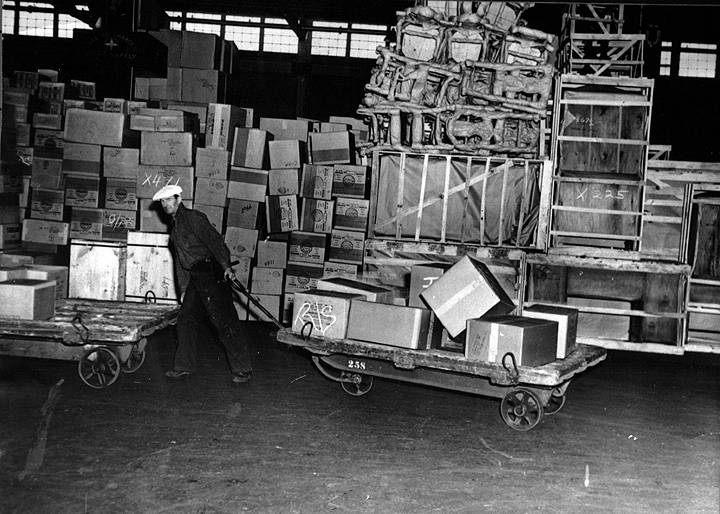Karl Yoneda
Historical Essay
by Tom Price, reprinted from The Dispatcher, May 1999
Karl and Elaine Yoneda as a young couple in the 1930s.
Karl Yoneda's father named him Goso, meaning "strength of three." He later re-named himself Karl after Karl Marx. Those two names would serve him well in his 92 years of life, the given name symbolizing his strength of character, the taken name honoring his penetrating analysis of capitalist society. He and his wife, Elaine Black-Yoneda, dedicated their lives to building the labor movement and were intimately involved with the history of the ILWU.
Yoneda was born to Japanese immigrant parents in Glendale, Calif. in 1906, and into an America still fouled by racism barely 40 years after the violent abolition of slavery. In 1913, with his father suffering from tuberculosis, his family returned to Japan. While still in high school and working as a paperboy, he participated in a strike against the newspaper when it increased the length of routes and didn't raise pay.
As a student Yoneda read the works of Marx and the Russian anarchist Vasily Eroshenko, who was kicked out of Japan in 1921 for his politics and lived in China. Yoneda found passage to China and hitchhiked to Beijing, meeting the blind Russian in 1922. Along the way in the port of Shimonoseki he worked his first job as a longshoreman unloading coal. He studied with Eroshenko for two months and took dictation, earning his way back to Japan.
Instead of returning to school he joined the labor movement, working on the printers' and rubber workers' strikes. He was arrested in 1925 for participating in those strikes and fined for publishing the unlicensed monthly Tsuchi (Earth), a journal for impoverished farmers. He decided to return to the U.S. rather than face being drafted into the Japanese emperor's army.
The S.S. Shunyo Maru sailed through the Golden Gate into San Francisco Bay and tied up at the NYK dock on Pier 25 Dec. 14, 1926. Yoneda watched from steerage as the people in first class lined the ships rail to wave handkerchiefs at their friends on the dock. As those of means happily left, Yoneda was taken to Angel Island, an immigration processing facility in the middle of the San Francisco Bay. Although he had his California birth certificate in his pocket, he was only released when his cousin arrived two months later.
Moving to Los Angeles, he found work organizing, this time with the Communist Party-affiliated Trade Union Educational League. AFL unions then excluded people of color as a matter of policy, but many Japanese found a welcome in the radical unions. In 1927 Yoneda joined the Japanese Workers' Association, which was organizing field workers, and became its publication director in 1928.
When Japan invaded China, the union was quick in its protest. Yoneda sneaked back into Japan in 1929, participating in the 100,000-strong May Day parade in Tokyo. Workers denounced both the governments of China and Japan for starting the mess that would become WWII in the Pacific. He marched with the most militant groups, and barely escaped when the police charged into the crowd. He quickly returned to San Francisco, this time with a passport.
The market crash of 1929 changed everything. The fact that capital could no longer employ millions of former workers led to desperate measures.
At a demonstration Feb. 10, 1931 in Los Angeles the Red Squad beat him severely and threw him into a cell. Whether by some stroke of compassion or just because he didn't want Yoneda dying in custody, Red Squad chief William Hynes called Elaine Black of the International Labor Defense group, whom the cops had dubbed the "Red Angel" for her tireless work getting strikers out of jail.
"'Come and pick up this goddamn Jap, he's dying anyway' he told me," Black recalled in her biography The Red Angel. "He was a bloody mess. The bandages hadn't been changed on his head. Everything was covered with blood."
She threw in $50 bail and rushed Yoneda to the hospital. Elaine and Karl soon became constant companions.
In early 1933 Yoneda received what he called the worst beating of his life. He and other protestors demanded to speak to the L.A. City Council, protesting the Red Squad's violent bust of a peaceful meeting of artists and writers, and were booted out. The Red Squad caught him alone in a freight elevator and beat him severely. During his three month-long recovery Elaine was sent to San Francisco by the ILD. By May he was offered editorship of the Japanese-language communist publication Rodo Shimbun and a chance to move to San Francisco. The first thing he did was to go to Elaine's office and when she got back from the "Free Tom Mooney" demo they looked at each other and knew they were still in love. Since California law forbade mixed race marriages, they eventually married in Seattle Nov. 5, 1935.
Seven years after his arrival from Japan Yoneda returned to Pier 25. May 9, 1934 was the first day of the coastwise maritime strike and the Japanese ship Tatsuta Maru had just tied up. The longshoremen asked Yoneda to ask the sailors not to scab. He appealed to the seamen and unloading was halted. The Rodo Shimbun and the Chinese Vanguard each issued appeals to their communities and joined the fight. The Japanese radicals supported workers up and down the Coast for years and it paid off as Japanese sailors refused to scab.
At the time there were almost no Japanese working on the docks, but they helped anyway. "We looked upon the longshoremen as a symbol of militancy and a source of inspiration," Yoneda said. "We regarded them as brothers to whom we could look for help when needed. We felt strongly that their fight was ours."
It was a dire moment. The police and bosses vowed to open the docks and on Thursday, July 5 they opened fire on workers near Mission and Steuart streets, killing two and wounding dozens more. Elaine had just left the ILA headquarters at 113 Steuart, and was pulled out of the line of fire by a longshoreman. Later she would identify the remains of Nick Bordoise, a longshoreman and member of the ILD. On July 17 the cops destroyed the offices of the Rodo Shimbun and more than 500 "reds" were arrested. Elaine remained on the strike committee, its only woman, as the strike turned into a general strike.
In 1936 Yoneda helped establish the Alaska Cannery Workers Union Local 20195 in San Francisco, where the employment office was located, and became vice president shortly thereafter.
The high cost of living in depression-era San Francisco created as many financial problems for Karl and Elaine as it created opportunities to fight the system. Yoneda needed a job. His African American friend, Len Greer, proposed Yoneda for membership at the longshore local's meeting Feb. 5, 1936.
"Brother Yoneda here was the Japanese American who helped our 1934 strike," Greer said. "Since our union advocates no racial discrimination and we have no Orientals I move we issue a permit to brother Yoneda."
When there was no immediate support Greer offered to adopt Yoneda as his son and have him admitted that way. The membership committee voted approval, and Yoneda became a permit worker with plug number 6002.
Karl Yoneda, Longshoreman and lifelong political activist.
Photo: ILWU Archives
Elaine was pregnant and went into labor shortly after a celebration for Tom Mooney's release from prison and their son, born January 10, 1939, was named Tom in his honor.
Toward the end of 1938 San Francisco longshore workers and Chinese and Japanese militants organized a demo against war cargo going to Japan at Pier 45. Karl and Elaine were first on the line when the boycott of scrap metal shipments to Japan began and Karl was picket captain.
Several thousand demonstrators tied up the docks as longshore Local 10 members refused to cross the line.
The day after the bombing of Pearl Harbor in 1941, just as his Local 10 gang began work loading 16-inch shells for the U.S. Navy, the FBI arrested Yoneda.
"Hey, you fellows," gang boss Copenhagen Hansen shouted to the FBI, "Karl is the main fighter in our union against Japanese militarism. You're arresting the wrong man!"
Other Local 10 members protested loudly, but to no avail. After 36 hours in custody, Yoneda was released with an apology.
He arrived home to find that the Communist Party, in a gesture of loyalty to the U.S. government's war effort, had suspended him, Elaine and all others of Japanese ancestry. Yoneda registered for the draft December 10.
Roosevelt signed Executive Order 9066 in February 1942, ordering the detention of 110,000 Japanese Americans.
Yoneda volunteered to help build the camp at Manzanar his family would be put into. His son Tom had to go because he was half Japanese. At first Elaine was not allowed to go, but she raised such a ruckus the officer in charge relented. She arrived April 1 with Tommy.
Yoneda's loyalty was affirmed by a very unusual source. "Yoneda is one of those rare individuals who is of Japanese descent, but is open and avowed in his Communist sympathies and anything but in sympathy with the present military regime in Japan," J. Edgar Hoover wrote in a memo dated April 23, 1942.
The FBI had Yoneda under surveillance even while he was in a concentration camp. He wrote letters supporting Harry Bridges in his deportation hearing and to Local 10, volunteering to work on the Dock Battalion, which would become the Seebees [U.S. Navy Construction Battalions]. He finally got his wish to join the U.S. Army in November.
Elaine and Tommy left the camp shortly afterward. Fascist internees targeted them for death because of their beliefs. She found work at Hills Bros. Coffee and membership in warehouse Local 6. Karl received battle decorations during the war, like thousands of Japanese who fought for the allies.
Warehouse work awaited those longshoremen who couldn't work the docks.
Photo: San Francisco History Center, SF Public Library
Yoneda's return to longshoring was typically controversial. The employers' association refused his re-admittance, but the arbitrator ruled in his favor. A kidney ailment kept him off the docks until 1957 and he obtained registered status in 1960. Elaine went to work for the ILWU-PMA benefits plan and joined OPEIU Local 29.
His mother survived the Hiroshima bomb and the family visited together when they went to Tokyo for a nuclear disarmament conference in the summer of 1960. His family continued antiwar activities throughout the 1960s and Tom sailed to the Soviet Union to protest that country's nuclear testing.
Yoneda returned for another protest at Pier 45 in 1964, this time in support of striking longshoremen in Japan and explained to the Japanese crew of the Molivia Maru the reasons for Local 10's refusal to work the ship.
Although he hung up the hook in 1972, Yoneda continued to work in the human rights movement. He wrote articles, lectured on labor history and remained an active communist. Elaine died May 25, 1988. On the day before she took part in a demonstration for peace in Nicaragua with Jesse Jackson at the Local 10 hall. She had been president of ILWU Auxiliary 16 and was active in OPEIU Local 29 politics until shortly before her death.
Karl Yoneda died May 8, 1999.



